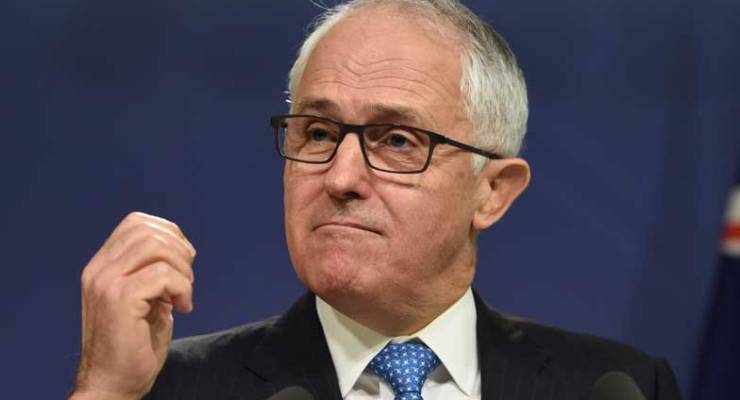
At one level, it would be petty to fault the Prime Minister Malcolm Turnbull for moving swiftly to announce a royal commission into the treatment of children in NT detention following the confronting Four Corners broadcast on Monday night.
But on another, the speed with which the PM made the decision suggests he gave little or no thought to the Pandora’s box of problems that would be unleashed by the move.
An account of the steps taken by the PM to make the decision helpfully appeared in the media today, perhaps to fend off any suggestion it was a knee-jerk captain’s call.
Turnbull reportedly spoke to Attorney-General George Brandis, Indigenous Affairs Minister Nigel Scullion, NT Chief Minister Adam Giles and Human Rights Commission president Gillian Triggs before making Tuesday’s announcement on early morning radio.
Yet almost as soon as the announcement was made, it began to unravel in a not entirely unexpected way.
Calls were made for the inquiry to be broadened to the mistreatment of young people in detention anywhere in Australia. This is a reasonable request given indigenous and youth advocates claim the abuse of young people in detention centres is a systemic and longstanding problem.
The PM has argued a quick and focused inquiry is preferred, protesting that a widening of the RC scope would cause it to “go on for years and years”, and that in his experience long-running royal commissions are “disappointing”.
Such a damning prime ministerial assessment of royal commissions, based only on their length, does no justice to the work of the inquiry into the sexual abuse of children, for example, which has been underway since early 2013.
Nor does the PM’s dismissal of lengthy RCs recognise that interim reports can be issued, such as the one from the royal commission into union corruption, which was published nine months after the inquiry was established and a year before the final report.
The PM’s persistence may be based on the assumption that quarantining the RC to the NT youth detention system will maximise the electorate’s perception of his decisiveness (a quality that has eluded Turnbull in recent times) while minimising the distraction from the government’s economic narrative.
However, Turnbull’s understandable horror at the treatment of these young offenders and enthusiasm to wreak justice in their name threatens to undermine the government’s only other perceived strength — border security.
Voters might not have initially made the connection between the NT’s juvenile “correction” system and the young people languishing in our immigration detention centres, but the image of a semi-naked Dylan Voller, hooded and strapped into a chair, quickly evoked memories of the Iraqi prisoners who were abused at Abu Ghraib prison during the War on Terror.
Having made that connection, it would have been easy to conclude that no child, not even a habitual law-breaker, deserves to be treated to the same human rights abuses inflicted on suspected terrorists and sympathisers.
However, the logical extension of that thought is to question whether the people being held in our immigration detention centres are any more deserving of being denied their human rights.
And this is where things could get very sticky for Malcolm Turnbull, and also for the Labor opposition.
The Prime Minister is due to acknowledge today that is has been two years since a boat carrying asylum seekers has successfully landed in Australia. That is some way short of Tony Abbott’s election commitment to “stop” the boats, but it will be a popular milestone nonetheless.
For the main, voters choose not to know what is going on in our offshore detention centres. The government’s “out of sight, out of mind” approach to border protection gives the community licence to enjoy the benefits of our “safe” borders without troubling ourselves with the uncomfortable detail of what is being experienced by offshore detainees in the name of deterrence.
But having been exposed to the abuse of Dylan Voller, will voters now be more sensitive to treatment of detainees more broadly? Instead of averting our eyes from the stories of self-immolation, sexual assault and mental breakdown — often involving young asylum seekers — and deluding ourselves that these broken lives are a small price to pay for our national security, will voters now demand justice for these detainees as they did for Voller?
Human rights advocates are certainly hoping so and are calling for the royal commission to include all minors “deprived of liberty” by the Australian government.
It is unlikely that this will occur. However there is likely to be increasing pressure on the government and the Labor opposition, which both support mandatory detention, to address one fundamental question.
Malcolm Turnbull and Bill Shorten must satisfactorily explain how the abuse of a young person in one type of detention centre can unleash the awesome investigative capacity of a royal commission, while the extreme suffering of a minor in another type of detention centre can be justified in the national interest.
And if they can’t explain it, then Turnbull and Shorten must do something to address the disparity.








Bravo, Paula: perfectly put!
“Malcolm the Ambulance Chaser”
What experience does he have with Royal commissions?
“For the main, voters choose not to know what is going on in our offshore detention centres” … they are concentration camps .. stop calling them detention centres .. let’s get a bit real .. call them as they are .. it may, possibly spark some of Australia to remember where they came from… and the trauma that got their families here.
It would be a joy to see the remit of this RC include the concentration camps in our name by slippage. It could almost happen. The term ‘hoist by one’s own petard’ comes to mind. Couldn’t happen to a more deserving crew.